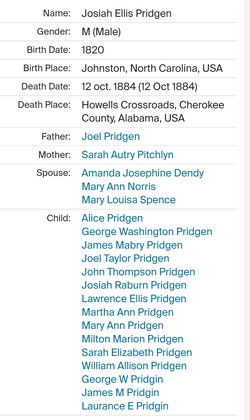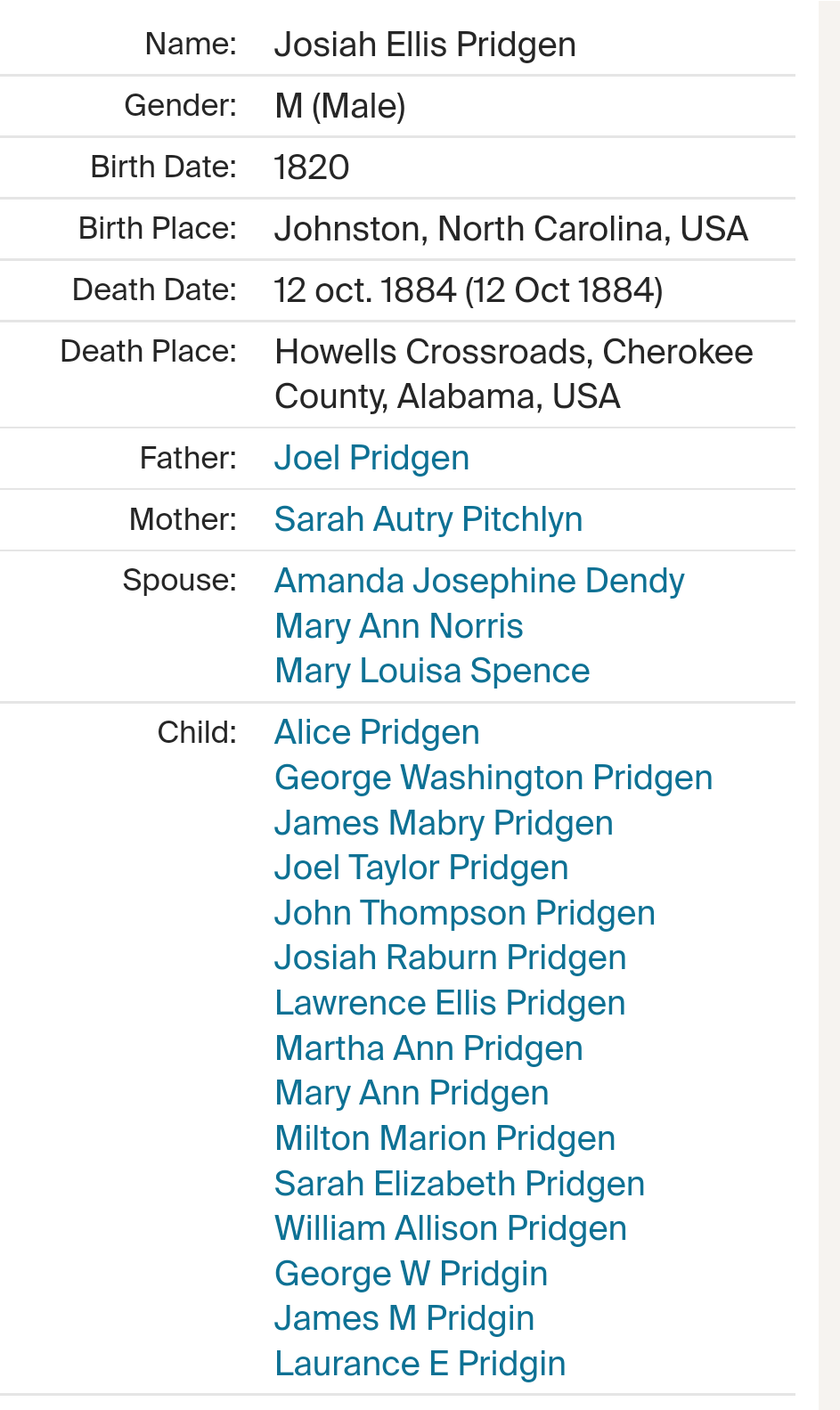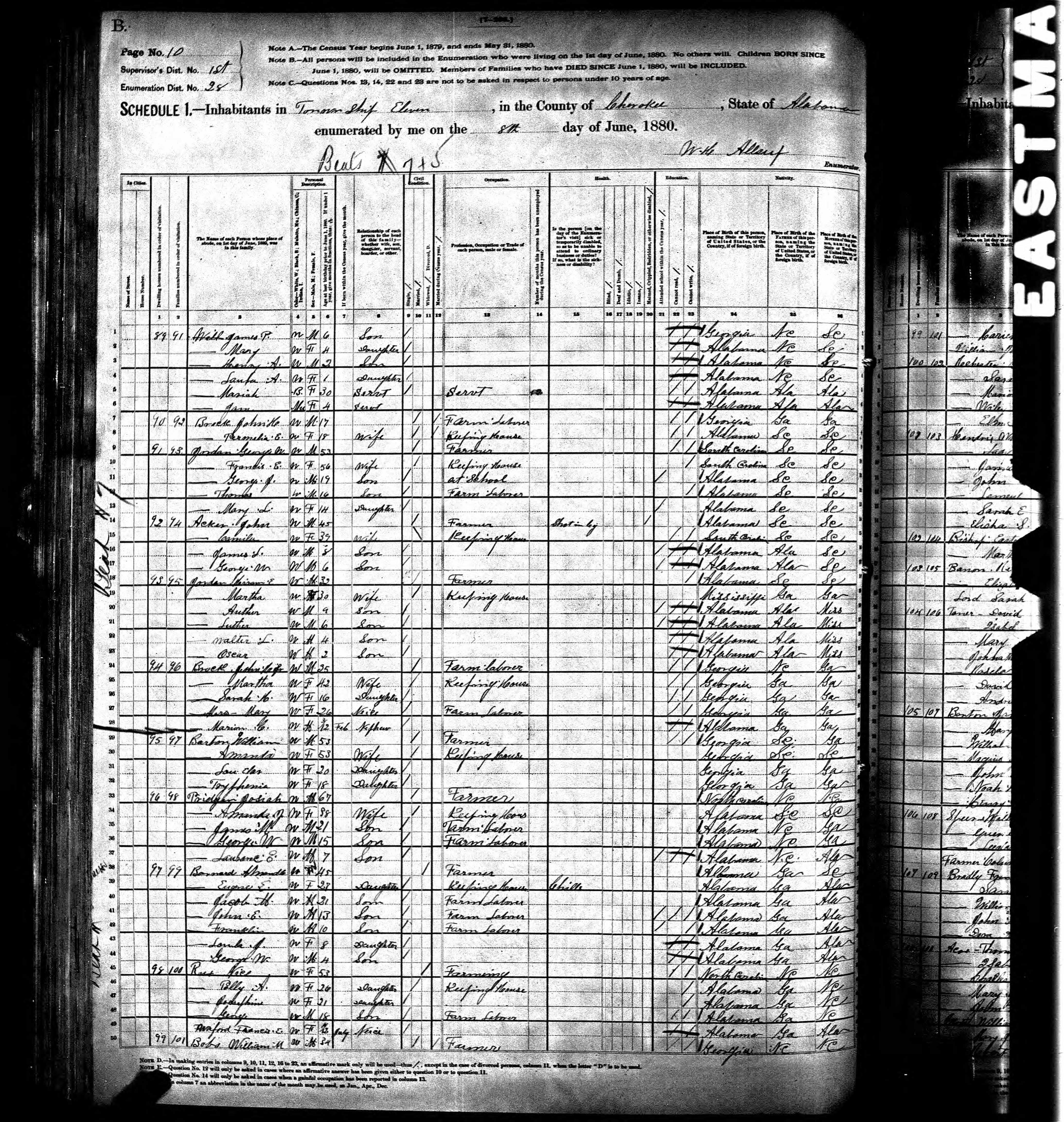In January of 1842 he marries Mary Louisa Spence and moves to the "Sanford Settlement". He farms near Spring Garden, AL, (Ambersonville ?), and Hebron /Crossroads.
The 1850 Census lists residence as District 27, Cherokee, Alabama. He is 39.
On Feb. 24, 1853 his wife, Mary Louisa dies.
Sometime between 1853 and 1858 he marries his second wife, Mary Ann Norris.
She dies Oct. 18, 1867.
He marries his third wife,Amanda Josephine Dendy Hughes, on Apr 12, 1868.
The 1870 Census lists his residence as: Township 11 Range 10, Cherokee, Alabama, United States; Age: 57; Census Post Office: Coloma.
Josiah petitioned US Government for property confiscated by the Rebel forces in 1864-1865. The list gives a good description of his farming operation.
Witnesses testified that Josiah had not been sympathetic to "the cause" and had not supported secession, but that he was a loyal citizen of the U.S.
CLAIM: An group of officers came onto his property saying they were under orders from General Sherman to take supplies as they were cut off from their supply lines and proceeded to take everything edible. (They were marching from ___, Alabama toward Atlanta, Georgia.)
Josiah testified in his deposition: "I complained to another official that I had a family to take care of and they were stripping me of all I had. He remarked that it was hard, but that they were cut off from supplies and were ordered to subsist off of the country. I never asked for vouchers or receipts and don't know why none was given. The property was all taken in the day time--excepting a few potatoes, about one bushel, one Saturday night. It was at all hours during the day--taken openly."
"They slaughtered all the hogs, cattle & sheep and took the pieces away on their horses. The cornmeal and flour were taken from the house and hauled off in pillow slips. The vinegar they put in canteens. The salt was taken from the smokehouse in sacks. His horse was taken from him while he was riding to see a neighbor. Everything was loaded in wagons and on and taken away leaving the family with nothing. The property was taken while the army was moving and it took them two days to pass the house."
Family members at home who witnessed this included Josiah, his wife, his sister-in-law, a son who had since died, and one other son (Milton M. Pridgen) who was presented as a witness and signed the document.
130 lb of bacon, 2000-3000 lbs of pork, 1300 lbs of beef, 15 head of sheep, 300 bushels of corn, 5 bushels of wheat, 1 dozen oats... 3000 bushes of fodder, 40 bushels of sweet potatoes, 40 bushels of Irish potatoes, 1 sorrel horse (5 yrs old), 200 pounds of flour, 150 pounds of cornmeal, 40 gallons of vinegar, and a large quantity of salt (some from the smokehouse and some from a neighbor's property.)
Total value of $1792.00
"Of six head of cattle, five were missing. (2 cows each yrs old, 2 steers each 3 yrs old, and one yearling six months old.) The crib was 14x8 (hands?) and 9 feet high. The products of the thirty acres all had been gathered. The land would have averaged ten or twelve bushels per acre--corn was worth one dollar and fifty cents per bushel--saw all taken--five bushels of measured wheat was taken--I had ten bushels in sacks and five bushes more were taken--the oats was taken from pens about fifty dozen bundles--worth forty cents per dozen. The oats was [?]--the food was taken from pens and loft--and bundles [?] which was worth two dollars per hundred and from bundles and [?] all taken off the potatoes sweet and Irish was taken from Potato house about four hundred bushels of sweet and forty bushels of Irish valued at one dollar per bushel--the Irish.... and all was taken."
The horse was five years old in good condition, good size and well worth two hundred dollars.
200 pounds flour, 50 pounds of cornmeal was taken that had just been returnred from the mill (2 bushels of ground corn) worth about 30 cents per pound. 40 gallons of vinegar in oak barrels was taken worth 75 cents per gallon.
Fifty pound of bacon was taken from the kitchen (sides, shoulders & hams)--22 head of hogs was taken that was from 15 months to 2 years old. Fourteen would have averaged over one hundred fifty pounds each and eight would have averaged about 60 pounds each." Josiah Ellis Pridgen
The size of the plantation is not given, but 35 acres were under cultivation.
REPLY TO PETITION:
Letter from George E. Lemon, Counselor at Law, Solicitor of Patents and Claims, 615 Fifteenth St., N.W., (Citizen's Nat. Bank Building.) P.O. Drawer 325, Washington, D.C.
Sept. 8, 1884
"Dear Sir, I have to acknowledge the receipt of $3.00, my fee for investigating your Southern Claims Commission case. As the result of my examination, I find that the claim was No.7239 for $1792. and was rejected upon the gound that your loyalty to the U.S. was not satisfactorily proven--one of the strong points against you being the fact of your sons being in the Confederate army--and it also appeared singular with Commissions that if you had been such a loyal citizen to the U.S., that you should have been chosen by the Confederates as a commissioner to distribute rations. There is not the slightest chance for you to receive--claim disablement Dec... (unclear). Resp. Geo E Lemon to Mr. Josiah E. Pridgeon."
Josiah dies a month later in October 1884 and his buried at Hebron Cemetery.
In 1984 I contacted Helen Watts who said that "his grave has no marker and accurate knowledge as to which of two graves it is cannot be determined." When I visited the cemetery that year most of the markers in the oldest section were missing completely, or the sandstone had been worn away so that no writing could be distinguished. There was no longer any settlement in that area and the church was no longer standing.
Submitted by Alix D. Pridgen
In January of 1842 he marries Mary Louisa Spence and moves to the "Sanford Settlement". He farms near Spring Garden, AL, (Ambersonville ?), and Hebron /Crossroads.
The 1850 Census lists residence as District 27, Cherokee, Alabama. He is 39.
On Feb. 24, 1853 his wife, Mary Louisa dies.
Sometime between 1853 and 1858 he marries his second wife, Mary Ann Norris.
She dies Oct. 18, 1867.
He marries his third wife,Amanda Josephine Dendy Hughes, on Apr 12, 1868.
The 1870 Census lists his residence as: Township 11 Range 10, Cherokee, Alabama, United States; Age: 57; Census Post Office: Coloma.
Josiah petitioned US Government for property confiscated by the Rebel forces in 1864-1865. The list gives a good description of his farming operation.
Witnesses testified that Josiah had not been sympathetic to "the cause" and had not supported secession, but that he was a loyal citizen of the U.S.
CLAIM: An group of officers came onto his property saying they were under orders from General Sherman to take supplies as they were cut off from their supply lines and proceeded to take everything edible. (They were marching from ___, Alabama toward Atlanta, Georgia.)
Josiah testified in his deposition: "I complained to another official that I had a family to take care of and they were stripping me of all I had. He remarked that it was hard, but that they were cut off from supplies and were ordered to subsist off of the country. I never asked for vouchers or receipts and don't know why none was given. The property was all taken in the day time--excepting a few potatoes, about one bushel, one Saturday night. It was at all hours during the day--taken openly."
"They slaughtered all the hogs, cattle & sheep and took the pieces away on their horses. The cornmeal and flour were taken from the house and hauled off in pillow slips. The vinegar they put in canteens. The salt was taken from the smokehouse in sacks. His horse was taken from him while he was riding to see a neighbor. Everything was loaded in wagons and on and taken away leaving the family with nothing. The property was taken while the army was moving and it took them two days to pass the house."
Family members at home who witnessed this included Josiah, his wife, his sister-in-law, a son who had since died, and one other son (Milton M. Pridgen) who was presented as a witness and signed the document.
130 lb of bacon, 2000-3000 lbs of pork, 1300 lbs of beef, 15 head of sheep, 300 bushels of corn, 5 bushels of wheat, 1 dozen oats... 3000 bushes of fodder, 40 bushels of sweet potatoes, 40 bushels of Irish potatoes, 1 sorrel horse (5 yrs old), 200 pounds of flour, 150 pounds of cornmeal, 40 gallons of vinegar, and a large quantity of salt (some from the smokehouse and some from a neighbor's property.)
Total value of $1792.00
"Of six head of cattle, five were missing. (2 cows each yrs old, 2 steers each 3 yrs old, and one yearling six months old.) The crib was 14x8 (hands?) and 9 feet high. The products of the thirty acres all had been gathered. The land would have averaged ten or twelve bushels per acre--corn was worth one dollar and fifty cents per bushel--saw all taken--five bushels of measured wheat was taken--I had ten bushels in sacks and five bushes more were taken--the oats was taken from pens about fifty dozen bundles--worth forty cents per dozen. The oats was [?]--the food was taken from pens and loft--and bundles [?] which was worth two dollars per hundred and from bundles and [?] all taken off the potatoes sweet and Irish was taken from Potato house about four hundred bushels of sweet and forty bushels of Irish valued at one dollar per bushel--the Irish.... and all was taken."
The horse was five years old in good condition, good size and well worth two hundred dollars.
200 pounds flour, 50 pounds of cornmeal was taken that had just been returnred from the mill (2 bushels of ground corn) worth about 30 cents per pound. 40 gallons of vinegar in oak barrels was taken worth 75 cents per gallon.
Fifty pound of bacon was taken from the kitchen (sides, shoulders & hams)--22 head of hogs was taken that was from 15 months to 2 years old. Fourteen would have averaged over one hundred fifty pounds each and eight would have averaged about 60 pounds each." Josiah Ellis Pridgen
The size of the plantation is not given, but 35 acres were under cultivation.
REPLY TO PETITION:
Letter from George E. Lemon, Counselor at Law, Solicitor of Patents and Claims, 615 Fifteenth St., N.W., (Citizen's Nat. Bank Building.) P.O. Drawer 325, Washington, D.C.
Sept. 8, 1884
"Dear Sir, I have to acknowledge the receipt of $3.00, my fee for investigating your Southern Claims Commission case. As the result of my examination, I find that the claim was No.7239 for $1792. and was rejected upon the gound that your loyalty to the U.S. was not satisfactorily proven--one of the strong points against you being the fact of your sons being in the Confederate army--and it also appeared singular with Commissions that if you had been such a loyal citizen to the U.S., that you should have been chosen by the Confederates as a commissioner to distribute rations. There is not the slightest chance for you to receive--claim disablement Dec... (unclear). Resp. Geo E Lemon to Mr. Josiah E. Pridgeon."
Josiah dies a month later in October 1884 and his buried at Hebron Cemetery.
In 1984 I contacted Helen Watts who said that "his grave has no marker and accurate knowledge as to which of two graves it is cannot be determined." When I visited the cemetery that year most of the markers in the oldest section were missing completely, or the sandstone had been worn away so that no writing could be distinguished. There was no longer any settlement in that area and the church was no longer standing.
Submitted by Alix D. Pridgen
Gravesite Details
grave no longer identifiable
Family Members
Advertisement
Explore more
Sponsored by Ancestry
Advertisement









